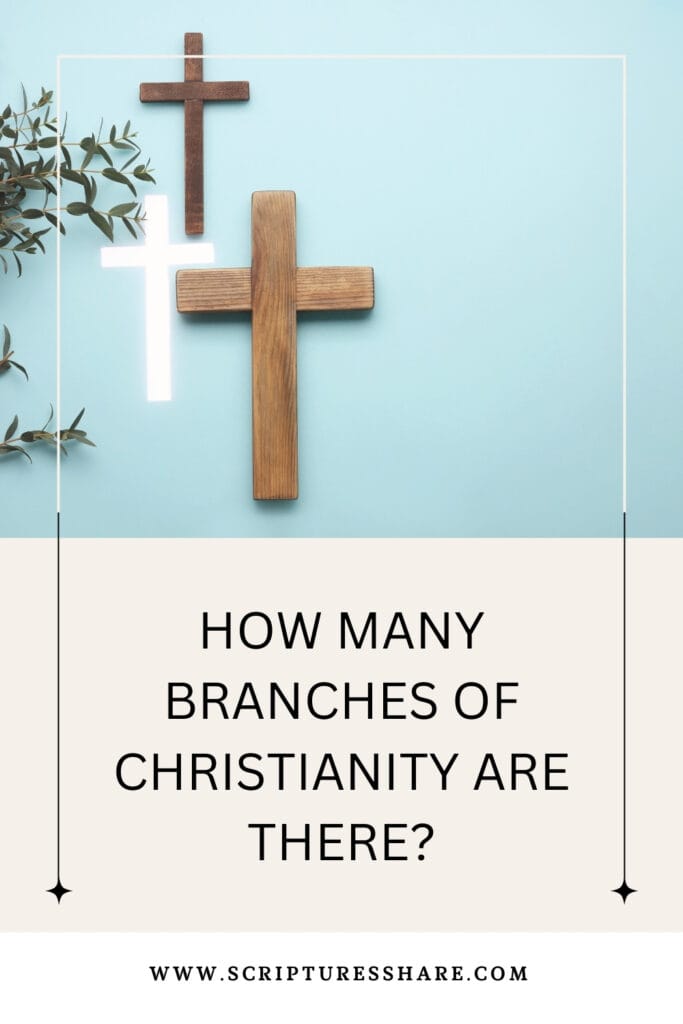No products in the cart.
How Many Branches of Christianity Are There?
This post contains paid and/or affiliate links. I make a small commission at no extra cost to you. Please see our Privacy Policy.
The Center for the Study of Global Christianity reports over 45,000 Christian denominations worldwide, including more than 200 in the United States alone. These branches of Christianity offer a rich mix of beliefs, worship styles, and historical ties.

Key Takeaways:
- Christianity is a diverse faith with many branches and denominations.
- There are over 45,000 Christian denominations worldwide.
- More than 200 Christian denominations are present in the United States.
- Christian denominations differ in their beliefs, practices, and historical ties.
- The variety of Christian denominations reflects the rich tapestry of interpretations of the Christian faith.
“Faith is taking the first step even when you don’t see the whole staircase.”
— Martin Luther King Jr.

Historical Development of Christian Denominations
Big schisms also shaped the early church. One was the Arian controversy in the early 4th century, which concerned Jesus’ nature and relationship with God. The Council of Nicea in AD 325 tried to resolve it, but disagreements lasted over a century.
The Great Schism occurred in 1054. It separated Eastern Orthodox Christians from Catholics, mainly due to Western Roman C differences in worship, theology, and church authority.
The Protestant Reformation began in 1517 with Martin Luther. Luther and others challenged the Catholic Church, arguing for personal faith, scripture-based worship, and the belief that all believers are priests.

Catholicism, Protestantism, and Eastern Orthodoxy
The Catholic Church is the largest Christian denomination. It has over 1.3 billion members. The Catholic Church sees itself as the original pre-denominational Church.
Protestant denominations , which include Anglicans, Baptists, Lutherans, Methodists, Pentecostals, and Reformed churches, have about 800 million to 1 billion followers.
Eastern Orthodoxy is the second-largest Christian body, with around 230 million followers. It considers itself the original pre-denominational Church.
The Eastern Orthodox Church has autonomous churches that recognize each other. The Catholic Church and some Eastern churches are in separate communions.
These branches of Christianity have different beliefs, practices, and histories.
“Do all the good you can, by all the means you can, in all the ways you can, in all the places you can, at all the times you can, to all the people you can, as long as ever you can.”
— John Wesley

Conclusion
Even though these groups have different beliefs, they all come from Jesus Christ’s teachings. This shared foundation is what ties them together.
Having many branches and denominations shows the lively and diverse faith of Christians worldwide. Each group has its own way of worship, beliefs, and community involvement, giving believers many chances to demonstrate their faith and meet other Christians.
Christian denominational families help people feel part of a community. They offer places to deepen faith and participate in worship and service together.
As Christianity continues to grow, its branches and denominations are key in shaping the religious world. They give believers opportunities to grow spiritually and find support in their communities.
The variety of Christian denominations means there are many places for people to find a community that fits their beliefs and worship style. This creates a welcoming and inclusive space within the Christian faith.
FAQ
What is a Christian denomination?
A Christian denomination is a distinct branch of Christianity characterized by unique beliefs, traditions, and practices. Each denomination offers different ways of interpreting the faith and worshiping God.
How many Christian denominations exist worldwide?
There are over 45,000 Christian denominations worldwide, each with unique traditions, worship styles, and beliefs.
Why are there so many different Christian denominations?
Christian denominations developed over time due to differences in regional practices, scripture interpretations, theological debates, and significant historical events, such as the Great Schism and the Protestant Reformation.
What are the largest Christian denominations?
The largest Christian denominations are Catholicism, Protestantism, and Eastern Orthodoxy, each having millions to over a billion members worldwide.
What was the Great Schism, and why did it happen?
The Great Schism, which occurred in 1054, divided Christianity into Eastern Orthodox and Roman Catholic branches. It stemmed from differences in theology, church authority, and worship practices.
What role did the Protestant Reformation play in creating new denominations?
The Protestant Reformation, led by figures like Martin Luther in 1517, challenged the practices of the Catholic Church. It led to the formation of numerous Protestant denominations that emphasized scripture-based worship and personal faith.
How do Catholicism, Protestantism, and Eastern Orthodoxy differ?
While all three branches share core Christian beliefs, they differ in their traditions, theological interpretations, church authority structures, and worship practices.
Are all Christian denominations recognized by each other?
Not all denominations recognize each other’s authority or practices. However, many denominations have mutual respect and often collaborate on social or community efforts.
How do Christian denominations influence a believer’s worship style?
Each denomination has unique worship styles, including differences in rituals, sacraments, music, and liturgy, providing believers with varied ways to express their faith.
Can Christians choose a denomination based on personal beliefs and preferences?
Yes, the diversity of denominations allows Christians to find communities that align with their personal beliefs, worship style, and cultural background, fostering a sense of belonging within the broader Christian faith.












